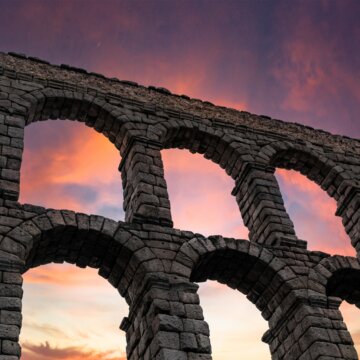- About
- Topics
- Picks
- Audio
- Story
- In-Depth
- Opinion
- News
- Donate
- Signup for our newsletterOur Editors' Best Picks.Send
Read, Debate: Engage.
| topic: | Sustainable Development |
|---|---|
| located: | Spain |
| editor: | Abby Klinkenberg |
As Spain continues to reckon with the effects of climate change, particularly in terms of drought and forest fires, scholars at the University of Granada’s MEMOLab – Biocultural Archaeology Laboratory are looking back into Spain’s agrarian past in pursuit of a more sustainable future. Acting at the intersection of cultural heritage preservation and environmentalism, MEMOLab is striving to restore the 1000-year-old hydrological network in support of rural communities in Andalucía. While many projects aimed at combating climate change have opted to invest in digital technologies and AI (like the EU’s recent initiative to create a digital twin of the Earth), this move to restore historical irrigation systems relies upon the eminently practical genius of Muslim peasant farmers dating back to the 8th century Umayyad conquest of Hispania (which constituted much of today’s Iberian peninsula). This model of looking to the past for answers to current environmental challenges continues to gain more traction in Europe and beyond.
In Spain, where Saharan dust fills orange skies and rising waters threaten critical infrastructure, the effects of climate change have been particularly harsh: “In 2020, the average temperature in [Spain] was 1.7 degrees Celsius higher than the average in preindustrial times, between 1850 and 1900.” To put this in context, the 2015 Paris Agreement strives to keep the global average temperature at a 1.5 degree Celsius rise compared to pre-industrial levels. In many ways, Spain is already on the other side of the threshold.
Farmers in particular have been hit hard by drought: “the leading association of farmers and livestock breeders in Spain […] warns that half of Spain’s farms are threatened by drought this year.” As reservoirs across the country’s southern region, including Andalucía, fall below 40 percent capacity, “Spain’s left-wing government plans to dedicate over 570 million euros… to make its irrigation systems more efficient.” Such a vast mobilisation of funds will largely “incorpor[ate] renewable energy systems,” but the successes of MEMOLab acequia (canal) restoration projects suggest another way forward.
Supported by local and European funding, the MEMOLab project is restoring Andalucía’s mediaeval hydrological network that spans thousands of kilometres and makes the most of the region’s sporadic rainfall. Instead of losing precious water to runoff, the acequia system “control[s] the flow of water, whether from rain or snowmelt… while [allowing] water to be absorbed into the land to replenish the aquifers in what is literally a trickle-down effect.” The water stored in aquifers is a critical resource in times of drought. Sergo Martos-Rosillo, a geologist engaged with the project, emphasised that this system is “more manageable and adaptable than building a dam and much more resistant to climate change.”
MEMOLab approaches mediaeval archaeology with a mind to both environmental and social factors, developing alternatives to contemporary forms of resource exploitation by drawing upon processes that proved effective in the pre-industrial age. In this case, recognising the rich history of Spain, particularly in terms of the groundbreaking agricultural practices initiated during Spain’s period of Islamic rule, leads directly to the revival of sustainable practices.
While the local restoration of the region’s acequia network has already favourably impacted the resilience of rural communities to drought, the lab’s wider vision is to inform ecological and cultural heritage initiatives across the wider Mediterranean and Europe in general: “The conservation of these landscapes can be carried out through the recognition of this heritage and the articulation of cultural and environmental conservation strategies for the sustainable development of rural areas; with the aim of protecting cultural heritage, and at the same time, increasing and transmitting knowledge about it for the benefit of local and European society in general.”
As Spain - and the world - continues to pursue increasingly pressing climate targets, initiatives like those pursued by MEMOLab will be critical. Overcoming the unsustainable resource extraction and environmental degradation associated with industrial tactics, the revival of historical systems and processes that allowed for the equitable and efficient sharing of vital resources offers a path to a greener future.
Image by Marco de Hevia

